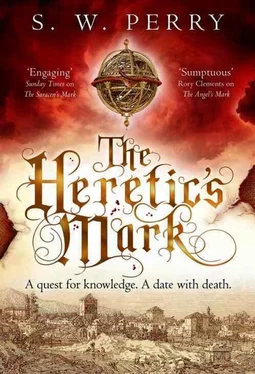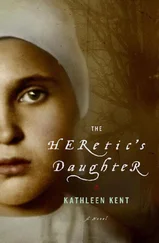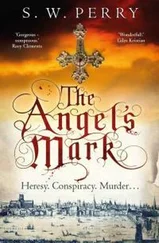Then silence, save for the sound of his own breathing and the faintest rat-a-tat-tat of drums, like the sound of a victorious army leaving the battlefield to the defeated and the dead.
A disturbance at the Palazzo Bo – even one involving a fatality – is just another irritant in a busy night for the Podestà and his staff. The night-watch has had its hands full ensuring that the Feast of the Holy Rosary passes off without the great and the good of Padua having their purses lifted by the larcenous, or the honour of their wives and daughters insulted by the impertinent. Thus it is daylight before Bruno Barrani’s body is found in the chamber below the dissection table of Professor Fabrici’s almost-completed anatomy theatre.
Found in the new black silk doublet he wears – purchased specifically for the procession, but now stained with dried blood from a single knife-thrust to the back – is a letter claiming to be from the rector of the university. In it, Bruno is asked to meet him in the seclusion of the anatomy theatre, the more privately to discuss the prospect of Signor Barrani taking a leading position on the university’s Studium, in reward for his tireless work on behalf of the city’s reputation. When the letter is shown to the rector, he barely reads beyond the first line before pronouncing it a forgery. ‘It’s not even in my hand,’ he says, before adding dismissively, ‘Anyway, why would Padua want a chancer like Signor Barrani for an exemplar?’
Bianca is almost inconsolable, and for a while Nicholas is racked by the fear that she will lose the child. He realizes that if she does, it will prove the power of Hella Maas’s curse, and he blames himself for not seeing through Hella’s deceit from the very start.
‘You saw what you thought was another human soul in distress,’ Bianca tells him. ‘You’re a physician. What choice did you have?’
Madonna Antonella allows the Podestà three days’ grace before she seeks an audience. He receives her in his palazzo with all the grace due to her piety. But as she tells him why she has come, his podgy face clouds over.
‘Heresy – here in our city? How did you learn of this, Madonna?’
‘A young Beguine, Sister Carlotta, who knows her duty to our Lord, has come to me,’ Antonella tells him from a kneeling position, adopted because, in his red gown, the Podestà looks to her very much like a cardinal, and she thinks it better to be safe than sorry. ‘She heard, apparently from our poor sister who had that dreadful accident in the Palazzo Bo, that this blasphemous device is able to predict events that God – and our Holy Mother Church – would wish impressionable minds not to know of.’
‘What manner of events, Madonna?’
‘The precise date, for instance, of the day of our final judgement.’
The Podestà manages a weak smile through the grinding of his jaw. When he regains control of his face, he reaches out to raise her to her feet. ‘You are right to have come to me, Madonna,’ he says generously. ‘But you need have no fear. None whatsoever. The device is not heretical, merely scientific.’ And with a benign smile he sends her on her way. He is a practical man; 4 per cent of the money His Serene Highness in Venice has set aside for the late Signor Barrani’s scheme cannot be endangered by the concerns of one unworldly woman, however pious.
But the Podestà has judged Madonna Antonella unwisely. She has contacts. She uses them. Ten days later he receives a visit from Cardinal Lorenzo Priuli, the Patriarch of Venice, who carries with him not only the doge’s authority, but that of God Himself.
‘If what Madonna Antonella tells me is true, this engine is heretical,’ he tells the Podestà, having failed to offer him one single smile since he walked through the door. ‘What is more, if the common people were to get hold of it, understand its workings, use it to determine matters the Almighty desires to remain unknown, then no prince in all Christendom would be safe from insult and overthrow.’ Then Priuli reminds him that while the Serene Republic likes to consider itself open to the new learning, it has its limits. Was not the heretic prior, Giordano Bruno, arrested in Venice only two years ago, after spreading his vile theories on the universe – and man’s place in it – throughout Europe? He will surely burn before long. And Podestàs, the cardinal observes ominously, are no more immune from God’s wrath than are heretic friars.
That very afternoon the Holy Office of the Faith descends upon the storehouse by the Porta Portello. By sunset it is empty. The timbers are burned, the iron carried away to be melted down for more practical usage, and the brass and gilt handed to the Church to be turned into something less troublesome. Nothing of Bruno Barrani’s great sphere remains. By order of the Council, the Arte dei Astronomi is struck from the roll of city guilds.
When the Patriarch departs for Venice, he leaves the Podestà with a written order from the doge’s treasury: return all monies as yet unspent.

Throughout the following weeks Nicholas keeps a careful eye on his wife. Slowly her grief subsides. Together, they take long walks along the banks of the Bacchiglione. The leaves lie scattered around the trees like fragments of discarded memories. But he is pleased to see that the dark, underlying mood that had preceded the events of the night of the Feast of the Holy Rosary seems to have lifted from her. He puts it down to the death of Hella Maas.
At the end of October, Ruben takes his leave of them. He has it in mind to join the Protestant community at Montreux. Bianca wishes him well, and keeps the conversation she had with his sister there to herself.
In November Nicholas is approached at the Palazzo Bo by a young student of law, an Englishman, though his dress is distinctly Paduan. He hands Nicholas a letter. ‘Don’t open it here,’ he says. ‘Should a reply be needed, seek me out.’ He doesn’t stay to give his name.
Upon opening it, in the privacy of Bruno’s study at the house in the Borgo dei Argentieri, Nicholas is confronted with a meaningless jumble of letters written in a neat, professional hand, the sort of hand a clerk at Cecil House might favour. Bianca watches as he sets to work decoding the cipher. She resists the desire to look over his shoulder to see what manner of future his quill is revealing. Don’t interrupt him, she tells herself sternly. Give him time. Thoughts of returning to England have begun to fade from her mind of late, but for Nicholas’s sake she would rather see him exonerated.
Eventually he begins to smile. He lays down the pen. ‘Mistress Merton, you’ll be relieved to know that you’re no longer married to an accused regicide,’ he tells her, the smile on his dependable jaw in severe danger of becoming a grin. ‘Apparently it was Fulke Vaesy who denounced me. He’s written a confession, admitting it was all a lie. We are free to go home.’
‘With a child well on the way?’ she says. ‘Shall we pack her in a crate like a set of pewter?’
‘I didn’t mean now, of course. Not at this very moment.’ He holds up the paper on which he has deciphered the letter. ‘Sir Robert says he could do with a second set of eyes and ears in Padua. More importantly, in Venice – England has no ambassador there.’
‘A second ?’
‘The English law student who gave this to me–’
‘And Cecil is suggesting you?’
‘Not officially.’
‘Does he intend to pay you?’
‘Not officially.’
They decide to put off a decision, at least until the child is old enough to travel safely.
Читать дальше













